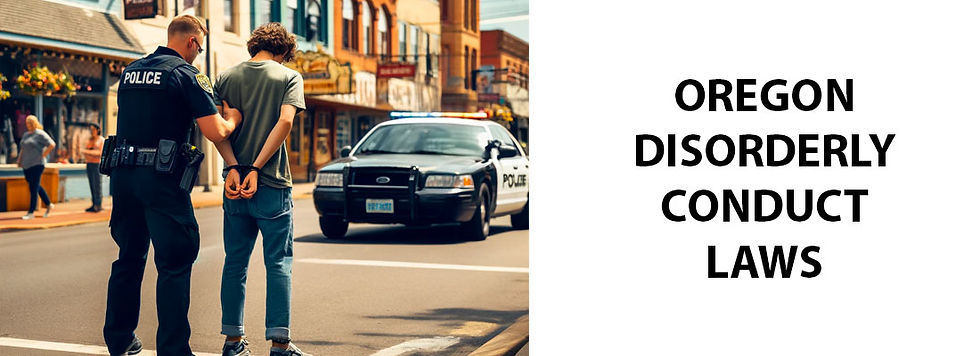The ORS Disorderly Conduct Law Guide: Punishments & Charges

ORS disorderly conduct in Oregon can often be hard to understand due to the wide range of behaviors it can cover. Essentially, it's a criminal charge that applies to actions that disrupt public order. This could encompass things such as threats, loud noise, or anything potentially causing danger.
What Is ORS Disorderly Conduct 1?
ORS Disorderly Conduct 1 in Oregon refers to more serious instances of disruptive behavior that disturb public peace or order. It generally involves conduct that creates a risk to public safety or causes significant public inconvenience. One common example is making a false report, such as calling in a bomb threat or falsely alerting authorities to an emergency. These actions can cause widespread panic or divert emergency services, which is why they’re treated more severely than other types of disorderly conduct.
In general, Disorderly Conduct 1 is reserved for situations where the conduct goes beyond simple disturbances and poses a real threat to public safety or well-being.
Examples of ORS Disorderly Conduct 1
1. Makes a false claim about a hazardous substance, fire, explosion, catastrophe, or other emergency
2. Claims that the hazardous substance, fire, explosion, or emergency is located in a court facility or public building
What is ORS Disorderly Conduct 2?
ORS Disorderly Conduct 2 in Oregon deals with less severe actions that still disrupt public order or create disturbances. While not considered as serious as Disorderly Conduct 1, it still involves actions that can cause inconvenience or alarm.
A common example of Disorderly Conduct 2 could be getting into a loud argument in a public place or obstructing a street or sidewalk without a valid reason. Even though these behaviors might not create a direct threat to public safety, they still disturb the peace and can interfere with others. Unlike Disorderly Conduct 1, this charge covers situations where the disruption is significant but doesn’t necessarily endanger others or cause widespread panic. It’s often used for less extreme actions, though it’s still
important to understand that it’s a criminal charge and can lead to legal consequences.
Examples of ORS Disorderly Conduct 2
1. Engages in physical fighting or threatening, aggressive behavior 2. Creates excessive or disruptive noise
3. Interferes with a lawful gathering without proper authority 4. Blocks vehicle or foot traffic in a public area
5. Knowingly spreads false information about an emergency situation, such as a fire, explosion, or crime
6. Creates a dangerous or offensive condition without proper permission or authority
Punishments for Both
● Disorderly Conduct 1 (Class A misdemeanor):
○ Up to 1 year in jail
○ Fines up to $6,250
● Disorderly Conduct 2 (Class B misdemeanor):
○ Up to 6 months in jail
○ Fines up to $2,500
Another important aspect to consider when dealing with disorderly conduct charges is the potential impact on your future. Even though disorderly conduct is a misdemeanor, a conviction can still leave you with a criminal record. A record might affect employment opportunities, housing options, or your ability to obtain certain professional licenses. It's also worth noting that the specific circumstances of your case—such as whether there was a prior criminal history, or if the disorderly conduct took place in a sensitive location like a school or airport—can influence the severity of the consequences.
Is it a Felony or Misdemeanor?
As mentioned above, disorderly conduct, whether it’s ORS Disorderly Conduct 1 or 2, is classified as a misdemeanor in Oregon. In the state of Oregon, whether an offense is classified as a misdemeanor or a felony typically depends on the severity of the crime and the potential harm caused.
How an Attorney Can Help
Some cases of disorderly conduct may involve misunderstandings or situations that were escalated unnecessarily. Having legal representation can help ensure that your side of the story is fully heard and that any mitigating factors are considered in court. An experienced attorney can often negotiate for reduced charges or alternative sentencing. This might include community service or counseling, which can lessen the long-term impact of a conviction.
An attorney can also help by examining the specific details of your case to identify possible defenses. For instance, they may challenge the evidence or argue that your actions didn’t meet the legal standard for disorderly conduct. In some situations, an attorney might show that your conduct was justified, or that law enforcement overstepped in handling the incident. By advocating on your behalf, a skilled defense attorney can help protect your rights, minimize penalties, and work towards the best possible outcome.
The ORS Disorderly Conduct Law Guide Conclusion
Understanding Oregon's disorderly conduct can be challenging due to the broad range of actions it covers. Whether charged with Disorderly Conduct 1 or 2, the penalties can be severe, so it's important to take any charge seriously and understand your legal options.
If you're in need of an experienced criminal defense attorney in the Medford area, contact our friendly staff at Kollie Law. We have an excellent reputation for putting our clients first and working diligently to achieve the best possible outcome for your case.
*Nothing herein constitutes legal advice. You should obtain independent legal counsel regarding your specific factual situation.




















Комментарии